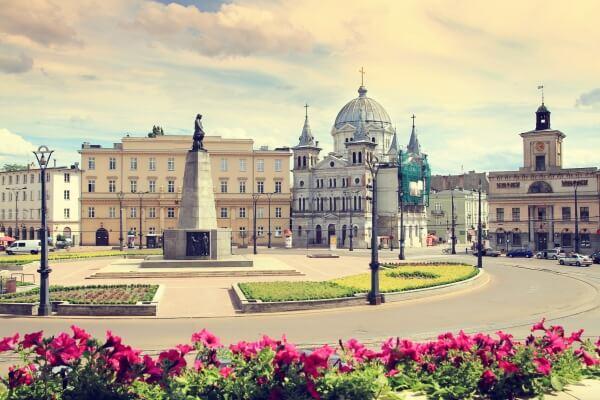Enhancing access to architectural heritage
Blind and visually impaired individuals encounter various obstacles in their daily lives, making it challenging for them to navigate the city independently or fully appreciate cultural offerings. However, with the advent of modern technologies, their independence can be significantly enhanced, allowing them to experience the world through senses other than sight.
A team of researchers led by Prof. Aneta Pawłowska from the University of Lodz has developed an information and communication system designed to assist individuals with visual disabilities in navigating the heart of Łódź while gaining insights into its rich architectural heritage.
Project team:
- Professor Aneta Pawłowska (project leader, University of Lodz)
- Piotr Milczarski, Ph.D. University of Lodz)
- Daria Rutkowska-Siuda, Ph.D. (University of Lodz)
- Artur Hłobaż, Ph.D. (University of Lodz)
- Anna Wendorff, Ph.D. (University of Lodz)
- Anna Śniegula, M.A. (University of Lodz)
- Adam Drozdowski, Ph.D. (University of Lodz)
- Magdalena Milerowska, M.A. (University of Lodz)
- Norbert Borowski, M.A. (University of Lodz)
- Izabela Krejtz, Ph.D. / Associate Professor (SWPS University)
- Krzysztof Krejtz, Ph.D. / Associate Professor (SWPS University)
- Katarzyna Wisiecka, M.A. (SWPS University)
- Professor Andrew T. Duchowski (Clemson University)
Mobile app guiding the way and depicting local monuments
The system developed by the researchers uses Bluetooth technology. Electronic beacons will be strategically placed at bus stops throughout the city center, establishing seamless communication with a mobile application installed on smartphones or smartwatches. As users approach a bus stop, they will receive precise voice-guided instructions, including the exact location of the stop, the nearest pedestrian crossing, and descriptive details about culturally significant buildings in the vicinity.
 Plac Wolności, Łódź
Plac Wolności, Łódź
Detailed audio descriptions of the monuments were carefully crafted based on eye tracking tests conducted among sighted individuals in Łódź. The analysis of eye movements revealed systematic differences in gaze patterns between art historians and casual observers, providing the foundation for adapting building descriptions to align with natural viewing patterns. The development process involved invaluable input from blind and visually impaired individuals at every stage, ensuring that the solution is tailored to their needs and expectations.
The mobile app will be available free of charge on Android and iOS devices. Moreover, the app will support multiple languages, including Polish, English, Ukrainian, and Spanish, benefiting not only visually impaired individuals but also tourists and seasonal workers. Through collaboration with the municipal transportation enterprise and the roads and transportation office in Łódź, the communication system will be integrated into the city's existing tourist information infrastructure. The project's scalability is promising, with plans to expand implementation throughout the Łódź agglomeration and potentially in other cities.
The "Friendly City" project is carried out by a consortium comprised of SWPS University and the University of Lodz and funded by the National Centre for Research and Development (project number: DWP/Rzeczy są dla ludzi/675/2021).
Euroinvent 2023: Celebrating innovation
Euroinvent European Exhibition of Creativity and Innovation, held in Iasi, Romania is the biggest event of its kind in Eastern Europe. Spanning from May 11 to 13, this year's edition attracted investors, researchers, and students from over 30 countries. It showcased more than 700 inventions and projects across 14 thematic categories, encompassing fields like environmental pollution control, healthcare, information technology, and sports.
For more information on the exhibition, visit the official Euroinvent website
Researchers from SWPS University contributing to the project